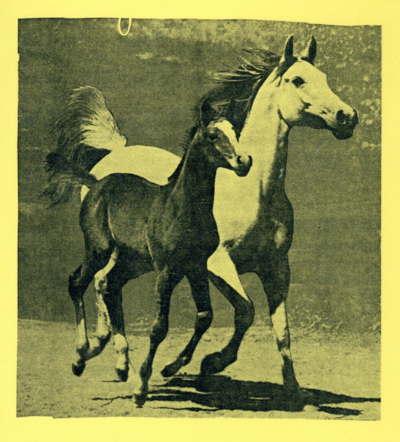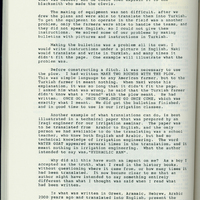122
Item
-
Title
-
122
-
Transcription
-
there seemed to be no word for this in Turkish, so I had to draw the article the best I could, until Naki understood what was needed, and he could then explain it to the blacksmith who made the clevis.
The making of equipment was not difficult, after we drew the plans and were able to translate them into Turkish To get the equipment to operate in the field was a another problem, only the farmers were able to handle the teams, an they did not speak English, so I could not give them instructions. We solved some of our problems by making bulletins with pictures and instructions in Turkish.
Making the bulletins was a problem all its own, I would write instructions under a picture in English, Naki would translate and write in Turkish, and many times it didn't fit the page. One example will illustrate what the problem was.
Before constructing a ditch, it was necessary to use the plow. I had written MAKE TWO ROUNDS WITH THE PLOW. This was simple language to any American farmer, but to the Turkish farmer it meant nothing. When Naki wrote his explanation, it was so long that it didn't fit the page. I asked him what was wrong, he said that the Turkish farmer didn't know what a "round" with the plow meant. He had written. ONCE GO, ONCE COME,ONCE [sic] GO [sic] ONCE COME, which was exactly what I meant. We did get the bulletins finished, and in good time to use in our irrigation classes.
Another example of what translations can do, is best illustrated in a technical paper that was prepared by an Iraqi engineer for our irrigation seminar. The paper was to be translated from Arabic to English, and the only person we had available to do the translating was a school teacher, who knew both English and Arabic, but had no technical knowledge of irrigation engineering. The word WATER GOAT appeared several times in the translation, and it meant nothing in irrigation engineering. What the author intended to say was,"HYDRAULIC [sic] RAM".
Why did all this have such an impact on me? As a boy I accepted as the truth, what I read in the history books, without questioning where it came from, or how many times i had been translated. It now became clear to me that an author might have intended to say something entirely different than what I thought was said when I read what had been written.
Is what was written in Greek, Aramaic, Hebrew, Arabic 2000 years ago and translated into English, present the thought and ideas that were intended? I can no longer read ancient history or even something written yesterday, without asking myself, IS THAT REALLY WHAT THE AUTHOR MEANT TO SAY?
-
Rights
-
To inquire about usage, please contact Archives & Special Collections, University of Nebraska-Lincoln Libraries. These images are for educational use only. Not all images are available for publication.
 Metzger Memories
Metzger Memories
 Metzger Memories
Metzger Memories
